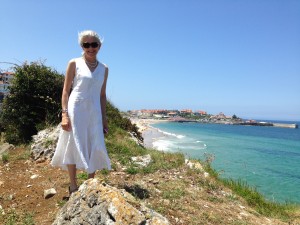The Transforming Beauty of Motherhood
I’m beginning this blog on Mother’s Day. Once each year in May, we all celebrate our mothers and motherhood. As I pondered Mother’s Day, getting together flowers, making a card, and arranging for dinner, I was captured by the thought that Mother’s Day is not enough. The American Mother’s Day may mask the fact that we don’t value motherhood much at all. If this is true, then Timothy Pattissa’s book, The Ethics of Beauty, serves as a much-needed corrective. [1] For Pattisas, motherhood lies at the foundation of society, the family, and any reasonable social order. And, of course, for the Orthodox and Roman Catholics, there really can’t be any discussion of motherhood without some mention of Mary.
The gospel of Luke records the visitation of Mary by the Angel Gabriel:
And the angel said to her, Fear not, Mary: for you have found favor with God. And, behold, you will conceive in your womb, and bring forth a son, and shall call his name Jesus. He shall be great, and shall be called the Son of the Highest: and the Lord God shall give him the throne of his father David: And he shall reign over the house of Jacob forever; and of his kingdom there shall be no end (Luke 1:30-33).
Mary responds with an act of acceptance, “May it be to me according to your word” (v. 28). As Pattisas notes, Mary opens her womb and life to the life of God in an act of holy hospitality.
 This act of hospitality by Mary has a theological significance beyond the mere acceptance of Mary. In opening her womb to the Holy Spirit and embracing God from the moment of conception, Mary becomes the “Theotokos,” the mother of God. The Incarnate Word has a mother, and with Joseph, a family. Thus, marriage and family are not a mere human institution; it is a divine institution made holy by God’s participation in the human condition from conception forward.
This act of hospitality by Mary has a theological significance beyond the mere acceptance of Mary. In opening her womb to the Holy Spirit and embracing God from the moment of conception, Mary becomes the “Theotokos,” the mother of God. The Incarnate Word has a mother, and with Joseph, a family. Thus, marriage and family are not a mere human institution; it is a divine institution made holy by God’s participation in the human condition from conception forward.
In this act of “holy hospitality,” Mary has become the human agent of God’s entry into the world in a great act of divine condensation to the human condition, In the incarnation, God makes visible in one human life what has been invisibly true from the beginning of time: Love and family lie at the center of human life and human society. Just as Mary consented to bear Jesus, our human mothers in their own act of divine hospitality welcomed us, nurtured us, fed us, clothed us, watched over us, taught us, and sent us on our way into the world.
Every conception is and should be seen as an act of divine hospitality welcoming a new child made in the image of God and intended to be a child of God into the world. This sits at the root of a Christian attitude towards the value of human life. This sits at the Christian view of the importance of motherhood, of family, of the home and homelife, and of the gradual entry into the world of God’s universal family through the church. The mother provides the womb of the family, the family offers the womb of social interaction and life, and society forms the womb of human life and culture in the broadest sense.
Motherhood and its importance have profound importance for our notions of society, for all of human society is founded on and depends on motherhood. Pattisas likens the emergence of human society from motherhood by analogy to fractals. The emergence of order in chaotic systems is the emergence in ever more complex ways of the original fractal order on which it is based. In other words, the order of society is dependent upon the order of the family as it exists from the moment of conception.
We see all around us the consequences of ignoring this reality. If a well-ordered and fruitful human society depends upon the womb’s hospitality, then the reverse is also true. The disorder of our society begins with the disorder of the womb. It starts with the disorder of human sexuality, committed marriage, holy conception, loving, birth, and nurturing care.
“Pantocrator,” the word we translate as “Almighty” in the creed describing “God the Father Almighty,” can mean “Almighty,” but it can also mean “All Embracing”. If we believe that God is a God of love, and if we think that an all-embracing Divine Love sits at the foundation of the created order, then all of creation reflects the womb of God. What Mary and our earthly mothers consented to reflects God’s embracing and nurturing love. It is this love that entered the world in Christ, and it is towards this love that Mary, the mother of God, showed holy hospitality.
It is also to this love that we respond by faith. In the gospel of John, there is a long discourse between Jesus and Nicodemus, in which Jesus teaches Nicodemus that to enter the kingdom of God, we must be born again. In part, it reads as follows:
Nicodemus saith to him, How can a man be born when he is old? Can he enter the second time into his mother’s womb, and be born? Jesus answered, Verily, verily, I say to you, Except a man be born of water and the Spirit, he cannot enter into the kingdom of God (John 3:4-5).
Just as Mary welcomed the Holy Spirit into her womb, we welcome Christ into the womb of our hearts.
I think this way of looking at faith is a healthy complement to the legalistic and contractual view of salvation that emerged from the Reformation. Our faith in Christ and welcoming God into our lives by the power of the Holy Spirit is precisely analogous to human conception. We open our hearts by faith and welcome the seed of divine life into our human life. Just as the ovum welcomes the sperm in an act of passive hospitality, so we welcome God into our lives (faith alone) in an act of passive hospitality (grace alone) by which we are born again into the family of God (the Church Universal) as children of God.
This conception and new birth is our birth into a family. We must be nurtured and grow in the faith (Christian discipleship), as we learn to be part of God’s family of worship, prayer, and service to the world. This involves a continuing act of birth and rebirth in Christ as we mature in God’s family into which we have been born anew. As Pattisas puts it:
Yes, if we would be born again as Christ commands us to be (Jn 3:3), then we must allow him to be resurrected, or born again, within us. Now Paul uses the words “formed within us” in Galatians 4:19 but he uses these words of connection with the “pains of childbirth,” so “resurrection“ is a valid paraphrase for being born again for us to be born again, Christ condescended to be born again within our hearts. [2]
This passage from Galatians is of special importance. Paul is admonishing the Galatians who have drifted away from appropriate discipleship. He describes himself as in the anguish of childbirth until Christ is fully formed in them. In other words, Paul has welcomed the Galatians into the womb of his loving care for them that he might give them birth and form them fully into the Christian family. In other words, our Christian birth and maturity are not transactional but organic and should be seen in light of human childbearing. The church itself is to be seen in light of the Theotokos and Mary’s act of holy hospitality and the holy hospitality our human mothers showed in giving us birth.
This realization of the importance of motherhood to human civilization has significant consequences in other areas. For example, if the universe and our world resemble the womb of a mother giving birth to creation, then just as we care for pregnant mothers and the womb that bears our children, we will care for the creation that is very much like this womb. We will not abuse it. We will not treat it as unimportant. We will nurture it. We will care for it. We will see that we don’t in any way do anything that would deprive future generations of the womb in which human society grows and upon which it relies for nourishment.
 America’s Mother’s Day is a secular holiday, and most of us, if we can and are inclined, take our mothers to church. However, Christians ought to see it as a holy holiday—more like Christmas and Easter than like the Fourth of July. Our mothers embody a divine mystery in giving us life. They embody the reality of a God who is love, who nurtures his creation, and who gives birth to beauty, health, wholeness, and all the blessings of life we can enjoy.
America’s Mother’s Day is a secular holiday, and most of us, if we can and are inclined, take our mothers to church. However, Christians ought to see it as a holy holiday—more like Christmas and Easter than like the Fourth of July. Our mothers embody a divine mystery in giving us life. They embody the reality of a God who is love, who nurtures his creation, and who gives birth to beauty, health, wholeness, and all the blessings of life we can enjoy.
Copyright 2025, G. Christopher Scruggs, All Rights Reserved
[1] Tomothy Patisis, The Ethics of Beauty (Maryville, MO: St. Nicholas Press, 2020). The ethics of beauty is a long book, almost 750 pages, and somewhat difficult to follow for a layperson. I am going to try to unpack the importance of its ideas for laypersons. I do not recommend it for those unwilling to read a book on ethics from an Eastern Orthodox perspective.
[2] Id, 408

